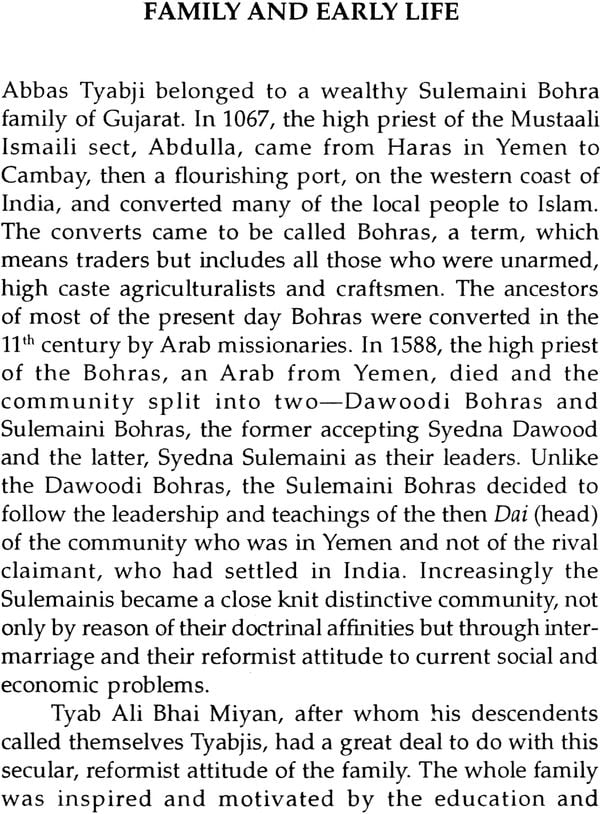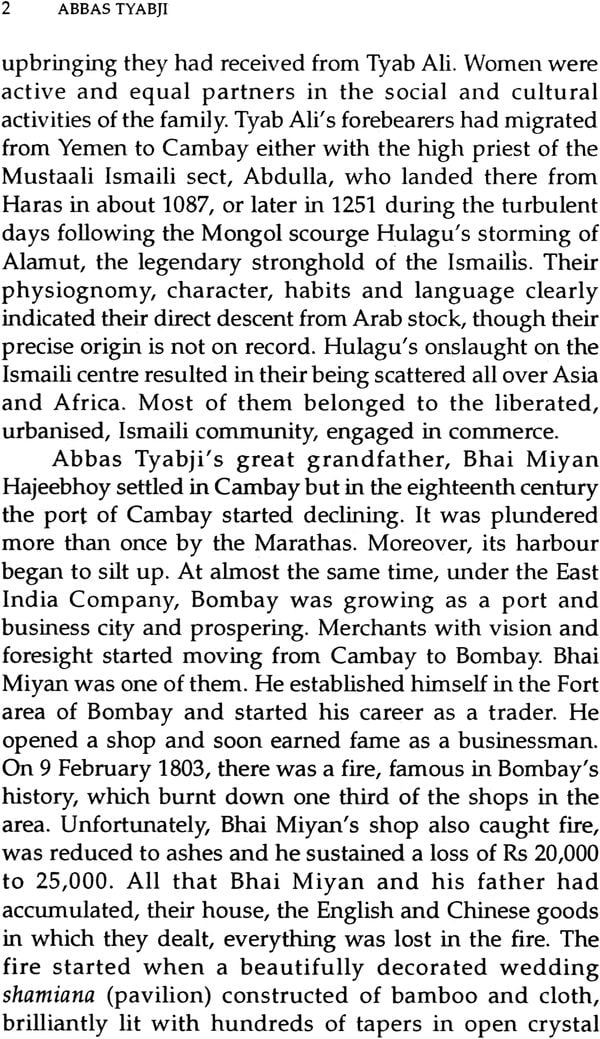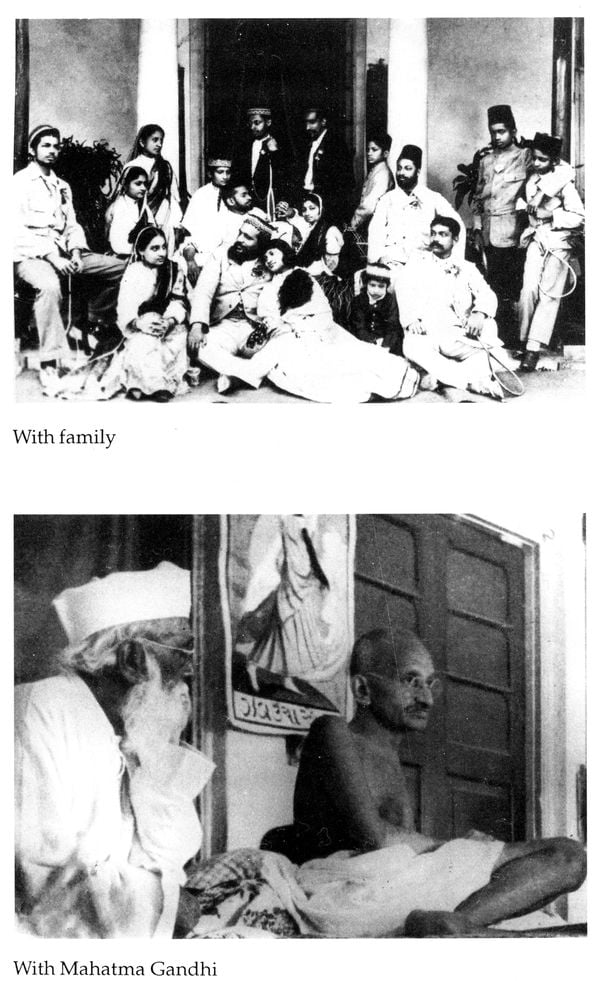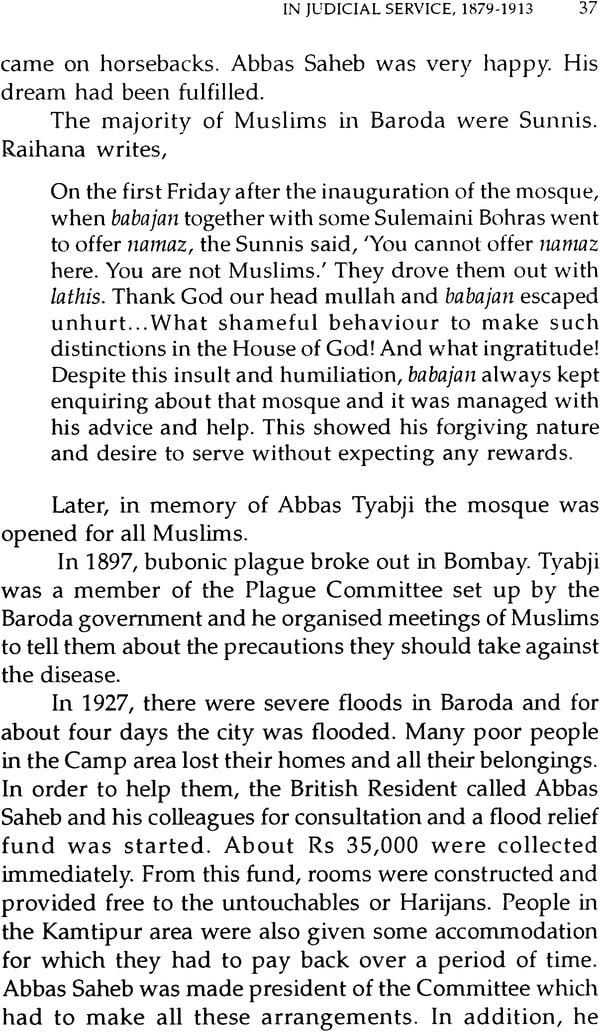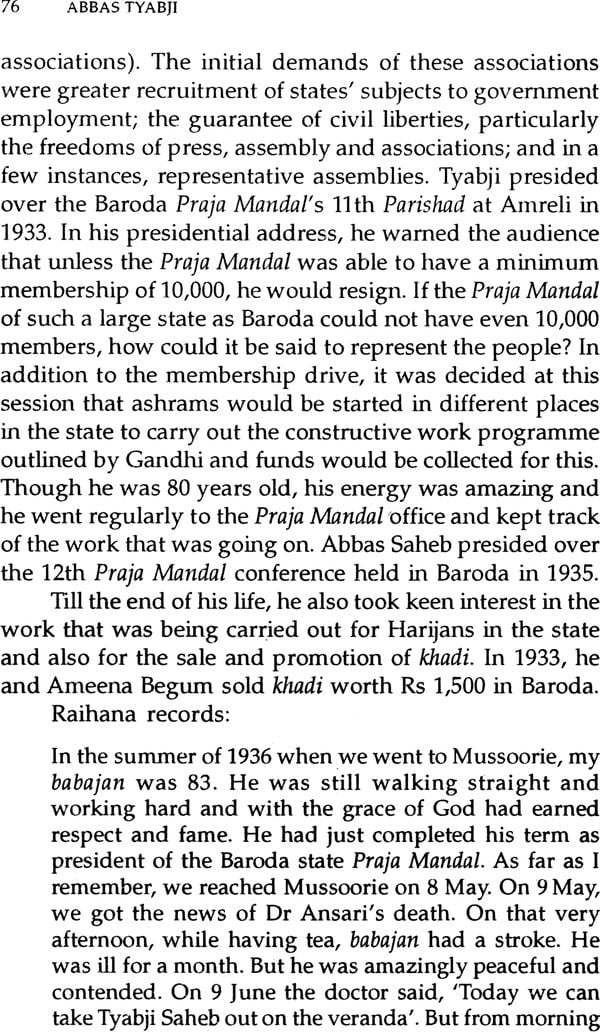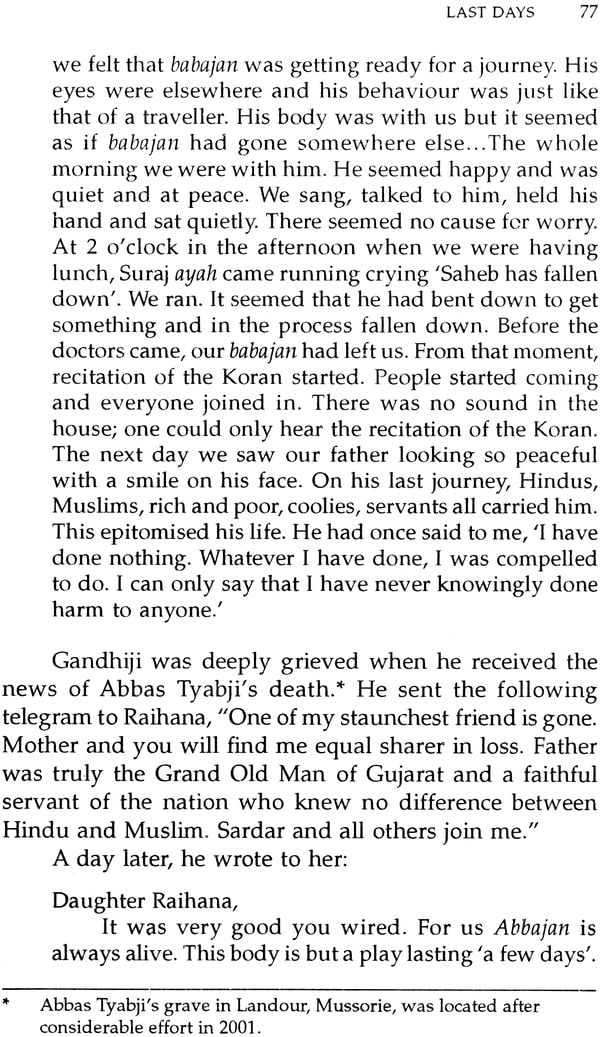
Abbas Tyabji
Book Specification
| Item Code: | NAJ871 |
| Author: | Aparna Basu |
| Publisher: | National Book Trust, India |
| Language: | English |
| Edition: | 2018 |
| ISBN: | 9788123750781 |
| Pages: | 100 (5 B/W Illustrations) |
| Cover: | Paperback |
| Other Details | 8.5 inch X 5.5 inch |
| Weight | 150 gm |
Book Description
Abbas Tyabji (1853-1936) was the Chief Justice of the Baroda High Court before becoming a staunch follower of Gandhiji. His absolute integrity as an individual, moderate persona, simmering nationalism and fairness as a judge were recognised even by anti-Congress extremists. He was one of the members of the committee appointed by the Indian National Congress to review the charges against General R. Dyer for the Jallianwala Bagh massacre. After listening to and cross-examining hundreds of eye witnesses and victims of General Dyer's brutality, Abbas was totally disillusioned and made a complete political somersault by becoming the most devoted co-worker of Gandhiji. Thereafter, he became a staunch champion of the Swadeshi movement. Abbas' services and sacrifices endeared him to the nation and earned him the title of 'Chhota Gandhi'.
The author Aparna Basu retired as professor of History from University of Delhi. She has to credit a number of publications which include the biography Mridula Sarabhai: Rebel with a Cause amongst others. She is currently the president of the All India Women's Conference and a visiting Fellow of Wolfson College, Cambridge.
Very few people today know of Abbas Tyabji. Yet in the 1920s and 1930s, his was a well known name all over India, especially in Gujarat, and he was often referred to as 'chhota Gandhi', though he was 15 years older than Gandhi. Born into a wealthy merchant Sulemaini Bohra family of Bombay, Abbas was first educated at home and then at a Missionary school in Bombay and later sent to England at the age of 11. He became a barrister, returned to India and joined the Bombay bar. In this, he followed the family tradition as his two uncles, Badruddin and Camruddin, had both been lawyers. Camruddin was the first Indian solicitor to qualify in London and Badruddin was the first Indian barrister to join the Bombay High Court.
After a few years in Bombay, Abbas Saheb moved to the princely state of Baroda and served the state for 34 years, beginning as an Assistant District Judge and ending his career as Chief Justice. He was renowned for his integrity, fearlessness, and impartiality.
The founder of the family fortune was Tyab Ali, grandfather of Abbas Tyabji. Beginning his life as a hawker on the streets of Bombay, Tyab Ali rose to be one of the leading merchant-citizens of Bombay with extensive trade connections with China and. France. Not only did he become a pillar of his own community but was also the founder of the Tyabji qabeela or clan which consists of the descendents of his six sons and four daughters. They learnt from him how to lead a life of courage, independence and enterprise. He taught them the importance of education and also religious tolerance and broadmindedness. The Tyabji family was often referred to as "the famous house of culture" and the Statesman once described it as a "brilliant family, representing the best type of Bombay Mohammedans, well-educated, virile and efficient with no lack of moral backbone to affect their remarkable attainments".
Abbas Tyabji inherited his grandfather's public spirit, his boldness, his love of education and breadth of outlook. He had a sense of civic consciousness and played a leading role in the social and cultural life of Baroda. He helped the administration in its efforts to combat the plague epidemic in Baroda as well as in organising relief work during the floods in 1927. He believed that Muslims could not progress without education and founded schools for Muslim boys and took a keen interest in the Urdu girls' school started by his wife which exists till today.
Abbas Saheb' was a man of versatile interests and the centre of Baroda's social life. His Sunday parties were open to all and he kept an open house where anyone could drop in. He loved people and anyone of importance who carne to Baroda was sure to meet him. He never made any distinction between Hindus, Muslims, Pars is or Christians. He loved music, art, reading, seeing plays and encouraged all members of his family to do likewise. He was an active member of the Society for the Encouragement and Preservation of Indian Art in Baroda. He was also fond of outdoor activities and sports-'shikar' (hunting), riding, tennis, badminton and hiking.
Badruddin Tyabji, the best known member of the family, was a founder member of the Indian National Congress and had presided over its third session in 1887 at Madras. Young Abbas was interested in politics and even while serving the Gaekwads, was a member of the Congress since its inception in 1885. He attended the 1889 session presided over by Sir William Wedderburn and the 1906 session in Calcutta at the time of the partition of Bengal where Dadabhai Naoroji presided. He was present at the historic session at Surat where the split between the 'extremists' and the 'moderates' took place. The man who threw the famous Marathi chappal at Tilak and then ran away was dressed like Abbas Tyabji and many in the crowd rushed towards him thinking he was the assailant, but then recognising him, were deeply apologetic.
Abbas opposed Tilak's boycott resolution as, like his uncle Badruddin, he also belonged at that time to the 'moderate' camp. Badruddin had welcomed Mahatma Gandhi when the latter returned to India from South Africa and Gandhi had great affection for him and the entire Tyabji family. Raihana, Abbas Tyabji's daughter, spoke to Kaka Kalelkar about "Bapu's special love for the Tyabji family". The patriotism of the Tyabjis was deep rooted. Raihana relates the story of a young girl of the family who was about 7 or 8 when the partition of India took place. As she was a Muslim, everyone in the school called her a Pakistani and did not talk to her. She was miserable and lonely. Then one day she wrote a poem, entitled 'My India' for the school magazine. When her classmates and others read it, they realised her feelings and sentiments for the country of her birth and their attitude towards her changed. "The Partition of India," recalled Raihana, "broke our hearts. I can't bear to look at the truncated map of India."
In his younger days, dressed in immaculate stylish European clothes, Abbas Tyabji was a strikingly handsome figure, resembling an Edwardian English gentleman. He had a flowing beard, bold aquiline features and a ruddy complexion. In his older days, with his silver white hair and long beard, dressed in coarse but spotlessly white khadi kurta, pyjama and Gandhi cap, he resembled an Old Testament patriarch, "a prophet of nationalism".
I have known many members of the Tyabji family. My mother's family came from Ahmedabad and I had a grand aunt and uncle who lived in Baroda and were close followers of Gandhi and hence the two families were quite close. But, I did not know much about Abbas Tyabji. I had heard his daughter, Raihana sing in Gandhiji's prayer meetings. She had a beautiful voice and her devotion and spirituality came through her singing. I had also visited Sharifa Hamid Ali, another daughter of Abbas Saheb, in 'Southwood', her delightful home in Mussoorie. 'Southwood' had been originally purchased by Abbas Tyabji from one Kirk Patrick and he and his family spent many holidays there. After his death, his daughter, Sharifa and her husband Hamid Ali bought it over. After their death, the demolition of 'Southwood' was prevented by public protest. The Uttar Khand Freedom Fighters' Association protects Abbas Tyabji's legacy.
Sharifa Hamida Ali had been very active in the Indian women's movement, and had been president of the All India Women's Conference. As a result, she knew my mother and aunts, who had also been associated with AIWC. Like her father and mother, she was also a very generous hostess.
When my oId student and friend Salima Tyabji approached me for writing a biography of Abbas Tyabji, I was tempted as I love reading and writing biographies. I have written three biographies and thoroughly enjoyed doing so. After some preliminary research on the material available, I agreed to undertake this task. I am grateful to her and to Anil Nauriya for persuading and encouraging me to write this book and to Professor Bipan Chandra and the National Book Trust, India for having given me this opportunity of writing about this fascinating character. I would also like to thank Neera Jain for her painstaking efforts in editing the book.
I have drawn on many sources. The diaries and private papers of Abbas Tyabji are preserved in the Nehru Memorial Museum and Library (NMML). I am grateful to the NMML for allowing me to consult these as well as a hand written, unpublished biography of Abbas Tyabji in Urdu by Syed Muhammad Dehalvi. The Badruddin Tyabji papers are also available in the NMML. There are two biographies of Abbas Tyabji in Gujarati one by Kalyanji V. Mehta and the other by Ravjibhai Manibhai Patel. I have liberally helped myself to material in these.
An unending stream of letters were exchanged between Gandhiji and Abbas Tyabji. From Gandhiji's side alone, it stretches across 52 of the 99 volumes of Mahatma Gandhi's Collected Works. I have consulted all these and quoted from them copiously. I got some letters of Abbas Tyabji to Gandhiji, courtesy the Sabarmati Ashram library, Ahmedabad and I am indeed very grateful to them for giving me a CD of these letters as well as the two Gujarati biographies.
I also consulted Mahadev Desai's diaries and Sardar Vallabhbhai Patel's letters. I read the autobiographies of Indulal Yagnik, Dr Sumant Mehta and Sharda Mehta, all of which were useful. These are all in Gujarati. I also consulted D.G. Tendulkar's volumes on Mahatma Gandhi and several other biographies of Gandhi and Sardar Vallabhbhai Patel. I am grateful to the Sarabhai Foundation, Ahmedabad for permitting me to consult some papers and books in their collection. There are biographies of Badruddin Tyabji by his namesake grandson Badruddin Tyabji as well as by A.G. Noorani. There are three books in Hindi by Raihana Tyabji, Suniye Kakasahib, Nashtese Pahele and The Heart of a Gopi. The first has many references to and anecdotes about her parents and family. I have quoted these after translating them from Hindi. My thanks to Salima Tyabji for lending me "The Autobiography of Tyabjee Bhoymeeah", edited and with an introduction by A.A.A. Fyzee in the Journal of the Asiatic Society of Bombay, 1961-62, vol. 36-37, which is not available elsewhere.
There are many roads to the field of history, one of which is biography. This book is therefore, in a way a page from the vast tome of the political history of modern India over the last century and a half, seen through the life of one man and some others who illuminated its pages.
| Introduction | vii |
| Family and Early Life | 1 |
| Education | 12 |
| In Judicial Service, 1879-1913 | 24 |
| The Gandhian Phase | 43 |
| The March to Dandi | 67 |
| Last Days | 75 |
| Biographical Notes | 83 |
| Bibliography | 87 |
